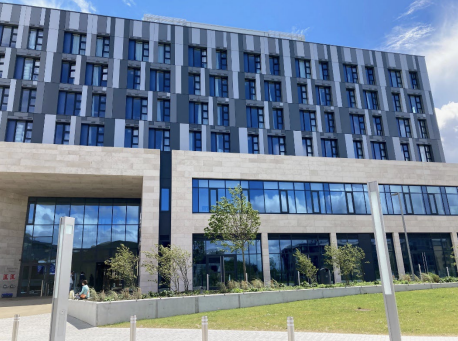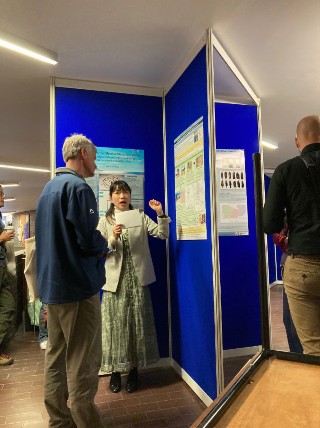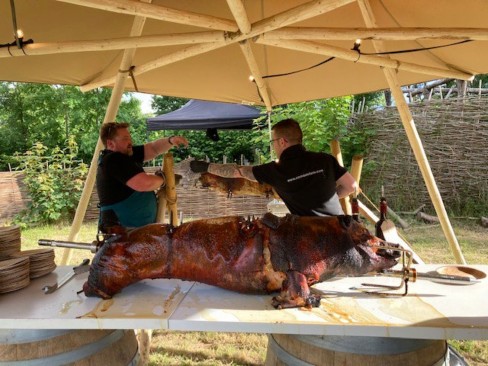Report on the Dispatch to Ireland: Participation and presentation at CHAGS13
Akira Takada
Professor
Graduate School of Asian and African Area Studies
Kyoto University

From June 25 to July 2, 2022, I visited the University of Dublin in Dublin, Republic of Ireland (Photo 1) to participate in the 13th Conference on Hunting and Gathering Societies (CHAGS13) held at the University and present my research. I also exchanged views with CHAGS13 participants on the ecological future making of childrearing in contact zones between hunter-gatherers and agro-pastoralists in Africa. For me, this was his first overseas trip since Covid-19, which almost stopped the overseas travel for more than two and a half years.
CHAGS has been held every few years since its first meeting in Chicago, U.S.A., in 1966, and this was the 13th meeting. It is one of the most intensive research conferences on hunter-gatherer societies, bringing together researchers in anthropology, area studies, geography, psychology, education, linguistics, and many other fields regarding hunter-gatherer societies from around the world in order to engage in enthusiastic discussions.
I organized a panel titled “Four approaches to studying childrearing among hunter-gatherers”. This panel presents and recommends a research framework that captures child development in an integrated and comprehensive manner from the following four approaches: (1) microgenetic development (moment-to-moment learning of individuals in particular contexts); (2) ontogenetic development (development that occurs in the time frame of an individual life span); (3) cultural-historical development (social development that leaves a legacy in the form of symbolic and material systems); and (4) phylogenetic development (slowly changing species history that leaves a legacy in the form of genes). It consists of an introduction and the following eight presentations (presenters are listed in parentheses)
- Four approaches to the analysis of gymnastic behaviors among the San of southern Africa (Akira Takada)
- Everyday Classrooms (David F. Lancy)
- The co-evolutionary history of birth as a hunter-gatherer cultural activity system: Evidence from the BaYaka (Adam H. Boyette, Senay Cebioǧlu, and Daša Bomjaková)
- Towards a broader understanding of childhood among the Yaghan: Tracing children’s material culture and spaces in Hunter-Gatherer societies by means of Yaghan’s ethnoarchaeology (Tierra del Fuego, South America) (Blanca Pierres Tejada, Ivan Briz i Godino, and Penny Spikins)
- Childcare in hunter-gatherer societies: The meaning of alloparenting in which children are raised in groups (Taro Yamauchi)
- Attachment Behavior of a Baka Infant and his Participation in Song and Dance (Ayana Tanaka)
- Reconsidering the Question of “Do Hunter-gatherers Teach Children?” (Koji Sonoda)
- Socialization among the Batek in Kelantan, Malaysia: An Aspect of Spatial Use of the Environment (Aya Kawai)
The presenters consisted of researchers from institutions in Japan, the U.S., Germany, the U.K., and other countries, and covered a variety of peoples, including San in Southern Africa, BaYaka and Baka in Central Africa, Yaghan in South America, and Batek in Malaysia. The background research fields were also diverse, including anthropology, ethnoarchaeology, and health sciences, and there were lively discussions in line with the purpose of the panel. Based on the presentations of this panel, we are considering submitting papers to a special issue of some academic journal.
In addition, a space for poster presentations was set up in the conference hall, and enthusiastic discussions were held, overcoming the barriers of research fields and regions (Photo 2). Furthermore, an excellent reception was held at a special outdoor venue during the conference. The reception featured a variety of beautiful and delicious dishes combining traditional and creative Irish cuisine, which were well received by the participants who came from various parts of the world (Photo 3).


The city of Dublin was beautiful and impressive (Photo 4). Unfortunately, some participants contracted Covid-19 during the conference. Unlike Japan, where masks are still required both indoors and outdoors, I was surprised to see only a few people wearing masks in Dublin, both at the conference venue and in the city center. However, the coronavirus itself seemed to be present in considerable density. The event made us think about countermeasures against infectious diseases.
The next CHAGS14 will be held in the United States in three years. Together with the panel participants and the accompanying ASAFAS graduate students, I pledged to work harder in my research activities and to return to this festive event to present my research.

